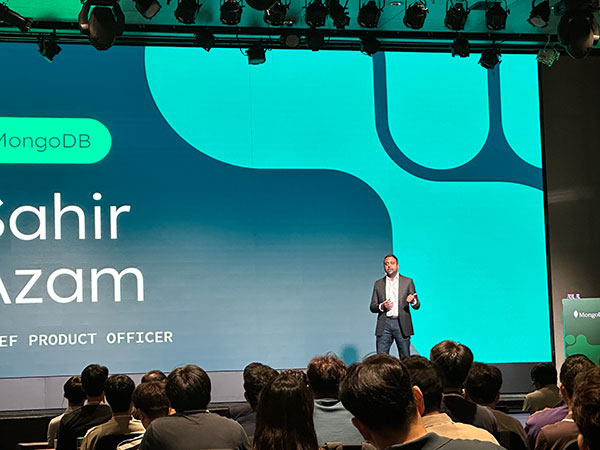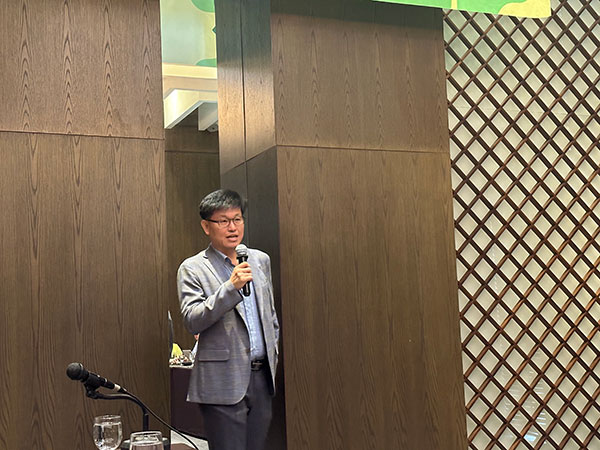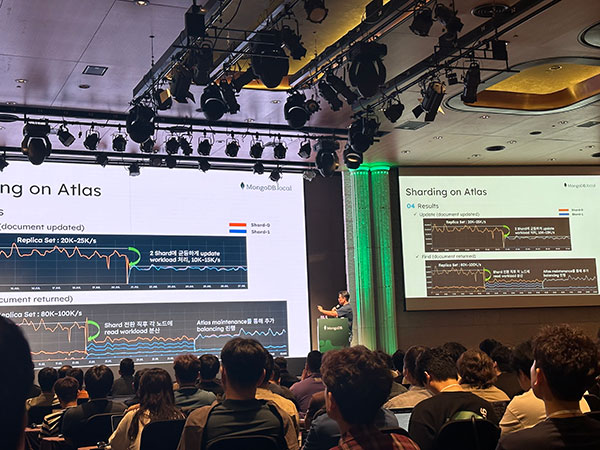몽고 DB가 13일 서울 엘타워에서 연례 개발자 컨퍼런스 '몽고 DB 닷로컬 서울'과 기자간담회를 개최해 개발자를 위한 몽고 DB의 SW 기술과 전략에 대해 발표했다. 몽고 DB 사히르 아잠 CPO는 기조연설에서 새로운 DB 솔루션들을 소개하며, "몽고 DB의 궁극적인 목표는 개발자에게 데이터 작업 시 오래 걸리는 시간을 줄여주는 것"이며, "개발자를 위해, 개발자가 개발한 점에서 차별화됐다"고 말했다.
13일 엘타워 몽고 DB 닷로컬 서울 개최
'벡터 서치' AI 검색·개인화 기능 통합
삼성전자, “여름철 가전 장애이슈 19건->0건 달성”
몽고 DB가 개발자를 위한 AI 기반 데이터베이스 관리 솔루션을 제공한다.
몽고 DB가 13일 서울 엘타워에서 연례 개발자 컨퍼런스 '몽고 DB 닷로컬 서울'과 기자간담회를 개최해 개발자를 위한 몽고 DB의 SW 기술과 전략에 대해 발표했다.

▲몽고 DB 사히르 아잠 CPO
몽고 DB 코리아 신재성 지사장은 환영사에서 "몽고 DB는 개발자가 선호하는 오픈소스 데이터베이스 1위 플랫폼으로서, 개발자가 가장 현대적인 어플리케이션 개발을 하도록 지원하는 게 목표"라고 말했다.
몽고 DB 사히르 아잠 CPO는 기조연설에서 새로운 DB 솔루션들을 소개하며, "몽고 DB의 궁극적인 목표는 개발자에게 데이터 작업 시 오래 걸리는 시간을 줄여주는 것"이며, "개발자를 위해, 개발자가 개발한 점에서 차별화됐다"고 말했다.
몽고 DB는 다양한 산업에서 4만5천개의 고객을 확보하고, 작년 450개 고객사에서 올해 680개로 230개 고객사가 늘며 의미 있는 성장을 기록해오고 있다. 삼성전자, 라이엇게임즈, 플로우, 현대차, 네이버쇼핑, SSG, 신한금융투자 등 다양한 산업군의 고객으로 두고 있다.
 ▲몽고 DB 코리아 신재성 지사장
▲몽고 DB 코리아 신재성 지사장
최근 현대화된 어플리케이션은 클라우드 기반으로 개발되는데, 다양한 요구를 충족하기 위해 데이터센터, 클라우드, 엣지와 모바일에 걸쳐 관리와 스케일링은 점점 복잡해졌다.
몽고 DB는 이를 지원하기 위해 업계 최초 분산된 클라우드 플랫폼을 출시했다. 몽고 DB의 아틀라스(Atlas) 플랫폼은 데이터 구축을 가속화하는 개발자 데이터 솔루션이다. 도큐먼트 모델을 적용해 데이터의 가능성을 극대화하여 코딩하는 대로 모델링 되도록 고가용성과 강력한 성능을 제공한다.
최근 몽고 DB는 개발자 데이터 플랫폼 아틀라스에 AI 기능을 접목하고 있다. 지난 6월 몽고 DB는 아틀라스에서 구동되는 애플리케이션에 AI 기반 검색 및 개인화 기능을 통합할 수 있는 몽고 DB 아틀라스 ‘벡터 서치(Vector Search)’를 발표했다.
벡터 서치는 몽고 DB 플랫폼 상에서 데이터의 유사성을 벡터화해 정보를 쉽게 찾을 수 있게 하는 기능이다. 쉽게 말해 오디오, 비디오, 이미지 등 비정형 데이터에 대한 정보도 쿼리 상에서 쉽게 검색을 돕는다.
예컨대 보험사에서 보험 관련 데이터 작업 시 서류들을 벡터화하고, 벡터 쿼리를 연결해 복잡한 정보를 쉽게 파악 및 관리하게 도와준다. 다양한 산업군에서 문제가 발생할 경우 기존 등록된 정보와 연결된 LLM 기반의 채팅 형식으로 해결방식을 얻을 수도 있다. 이는 개발 시간과 비용을 절감할 수 있을 것으로 기대된다.
몽고 DB는 AI 이노베이터 프로그램 등 기업의 AI 기술 도입을 지원하며 선도적인 개발자 생태계 구축에 앞장서고 있다. 사히르 아잠 CTO는 “몽고 DB는 가장 광범위한 커버리지를 확보하고 있으며, 주요 클라우드사 모두와 파트너십을 유지하고 있다”고 말했다.
■ 삼성전자 스마트홈 마이그레이션 사례 소개
 ▲삼성전자 DA 사업부 임성빈 프로
▲삼성전자 DA 사업부 임성빈 프로
이날 행사에는 IoT 스마트홈 데이터 처리를 위해 몽고 DB를 도입한 삼성전자가 발표에 나섰다. 삼성전자 DA 사업부 임성빈 프로는 몽고 DB 아틀라스로 마이그레이션 사례를 발표했다.
삼성전자에 따르면, 2023년 스마트홈 등록 기기 수는 1600만대로 급격히 증가했고, 이에 따라 유입되는 트래픽이 많아져 전문 인력, 기술 지원 등 이슈가 많아졌다.
삼성전자 스마트홈 플랫폼 스마트싱스는 가전제품, 조명, 보안 등을 어플리케이션에서 연결해 제어하는 서비스로, 최근 증가하는 트래픽을 제어 및 관리하기 위해 몽고 DB를 도입했다고 전했다.
삼성전자는 2015년 몽고 DB를 처음 도입, 2022년 아틀라스 플랫폼을 도입하고, 2023년에는 샤드(Shard) 전환을 진행했다.
'데이터베이스 샤드'는 데이터베이스의 데이터 수평 분할을 의미한다. 기존의 모놀리식 아키텍처에서 스케일링 하는 데는 용량에 한계가 있는데, 분산형으로 구축하면 훨씬 저렴하게 HW를 수평적으로 사용 가능하다는 이점이 있다. 샤딩 작업으로 분산된 데이터에서 쿼리로 원하는 정보를 빠르게 찾을 수 있다. 이를 통해 확장성은 높이고 비용은 낮아진다는 설명이다.
임성빈 프로는 “아틀라스 마이그레이션을 통해 평균 응답속도가 8ms에서 3ms로 줄었고, 가용성을 나타내는 레이턴시도 최대 3s에서 최대 18ms로 줄었다”고 말했다. 또한 여름철 트래픽 급증을 보장하기 위해 도입한 샤드 전략으로 장애 이슈가 19건에서 0건으로 감소했다고 발표했다.


